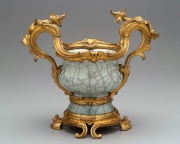Difference between revisions of "Crackle"
m (Text replace - "== Authority ==" to "== Sources Checked for Data in Record ==") |
m (Text replace - "[http://cameo.mfa.org/materials/ h" to "[h") |
||
| Line 13: | Line 13: | ||
º S.Bucklow, "The description of craquelure patterns", ''Studies in Conservation'', 42: 129-140, 1997. | º S.Bucklow, "The description of craquelure patterns", ''Studies in Conservation'', 42: 129-140, 1997. | ||
| − | º For information on cracks caused by humidity and temperature see: M.F. Mecklenburg, Smithsonian Museum Conservation Institute, "Determining the Acceptable Ranges of Relative Humidity And Temperature in Museums and Galleries" [ | + | º For information on cracks caused by humidity and temperature see: M.F. Mecklenburg, Smithsonian Museum Conservation Institute, "Determining the Acceptable Ranges of Relative Humidity And Temperature in Museums and Galleries" [http://www.si.edu/mci/downloads/reports/Mecklenburg-Part1-RH.pdf Part 1, Structural Response to Relative Humidity] and [http://www.si.edu/mci/downloads/reports/Mecklenburg-Part2-Temp.pdf Part 2, Structural Response to Temperature] |
== Sources Checked for Data in Record == | == Sources Checked for Data in Record == | ||
Revision as of 11:45, 2 May 2016
Description
A term used to describe network of fine cracks that may occur on paintings, ceramics, glazes, glass, and lacquer. The crackle pattern sometimes provides an indication of the points of stress. For example, a radiating pattern (bull's eye or spider web) may indicate a central point of impact, while linear damage may be due to creasing, bending, or stretching. The direction, regularity, size, and shape of the islands between the cracks have been studied and related to painting styles and materials used during different time periods by Bucklow (1997).
Synonyms and Related Terms
reticulation; craquelure (Fr.)
Additional Information
º S.Bucklow, "The description of craquelure patterns", Studies in Conservation, 42: 129-140, 1997.
º For information on cracks caused by humidity and temperature see: M.F. Mecklenburg, Smithsonian Museum Conservation Institute, "Determining the Acceptable Ranges of Relative Humidity And Temperature in Museums and Galleries" Part 1, Structural Response to Relative Humidity and Part 2, Structural Response to Temperature
Sources Checked for Data in Record
- Richard Buck, Inspecting and Describing the Condition of Art Objects, Museum Registration Methods, AAM, Washington DC, 1979
- The American Heritage Dictionary or Encarta, via Microsoft Bookshelf 98, Microsoft Corp., 1998

